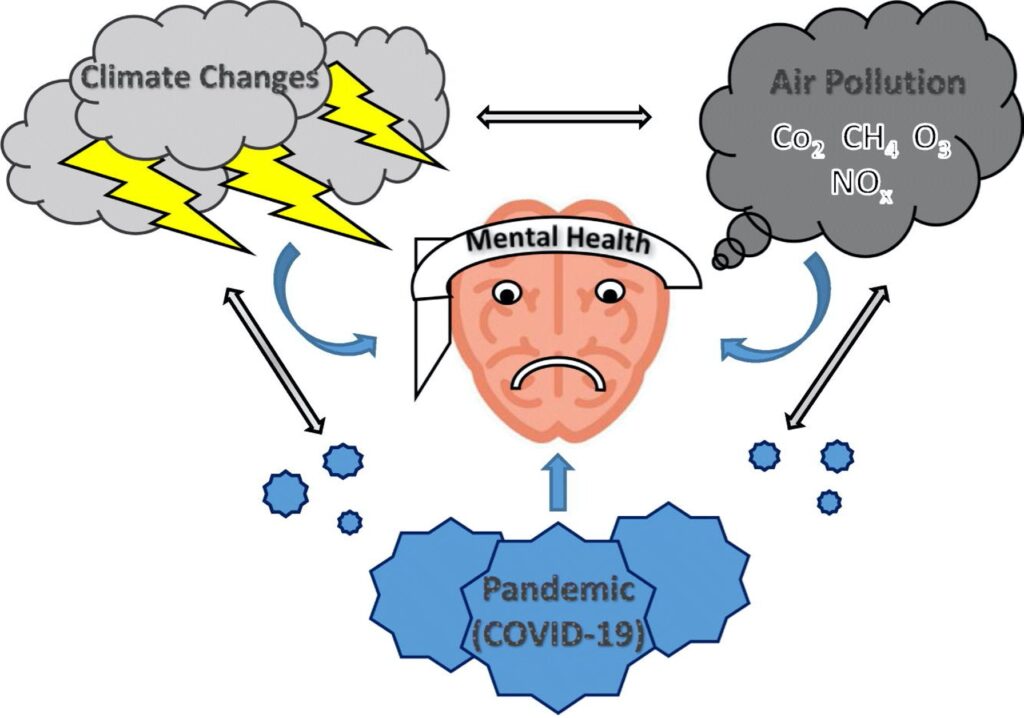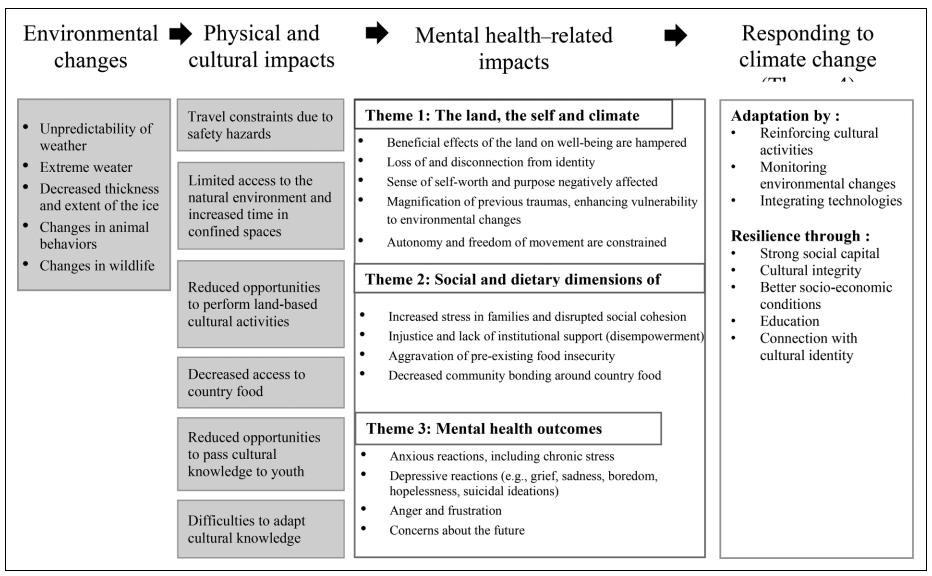Energy Innovation partners with the independent nonprofit Aspen Global Change Institute (AGCI) to provide climate and energy research updates. The research synopsis below comes from AGCI Program Director Emily Jack-Scott and a full list of AGCI’s updates covering recent climate change and clean energy pathways research is available online at https://www.agci.org/solutions/quarterly-research-reviews
People around the world are increasingly aware of and impacted by climate change, which is connected unsurprisingly with a parallel uptick in associated mental health stress. A rich body of research examines the psychologies of how individuals and communities perceive and respond to climate change information, but peer-reviewed publications about the impacts of climate change on mental health are just emerging.
Recent review articles authored by Ojala and colleagues in 2021 as well as by Cianconi and colleagues in 2020 highlight the challenges of studying this area along with the lack of representation in current research among those most vulnerable to, and those most impacted by climate change.
Tackling climate change will require economic and social transformation, but this level of change can only be achieved with political pressure from a critical mass of individuals and communities spanning demographics, socio-economic status, and geographies. Achieving and sustaining that level of action requires that people are not incapacitated by climate anxiety or despair.
As Ojala and colleagues note, people are best able to cope with climate change when they feel empowered to act. As Hayes and colleagues wrote in a 2018 debate article, taking action can make the difference between a person feeling passively hopeful for a different future or actively hopeful in ways that fuel progress toward achieving that future. But providing supportive services requires a better understanding of climate change’s effects on the mental health of all people. This is especially urgent and needed for those experiencing the worst impacts of climate change, which are disproportionately from marginalized and Indigenous communities.
Studying mental health impacts of climate change is incredibly complex
Understanding the convergence of two of our world’s most intricate systems (the natural environment amidst a changing climate and the human mind) is no small feat. Researchers must parse diverse variables (pre-existing mental conditions, demographics, culture, religion, geo-politics, to name a few), before they can attribute causal (as opposed to correlative) pathways. Challenges like these can make it very difficult to determine if a person becomes depressed because of climate change or if a pre-existing depression colors their concerns for a changing climate.
Further complicating matters, we must measure a whole range of mental health impacts. Cianconi and Ojala point to associations between climate change and depression, anxiety, grief, despair, existential worry, personality disorders, post-traumatic stress disorder (PTSD), aggressive behavior, insomnia, substance abuse, and even suicide.
Climate change stressors affect people’s mental well-being through many pathways: worrying about loved ones’ safety in the short- and long-term; challenges to self-identity and esteem; anticipated and realized loss of valued places, livelihoods, and people.
These varying mental and behavioral states are measured through an array of methodologies (from surveys to case study analysis, interviews, and experimental studies), further complicating any direct comparison across research projects, even when they are focused on relatively similar scenarios.
Timescale is another key variable in making causal attributions. Climate change is unfolding over years and decades, but is punctuated by extreme events, which can take place over minutes, hours, days, or months. Associated mental health impacts can be immediate or develop over longer timeframes.
The impacts of extreme events on the human psyche can be direct and indirect. For example, a heat wave may have immediate, direct mental health effects—spiking rates of aggression, mood disorders, schizophrenia, or mania. Near-term, indirect impacts can surface for flood survivors as they grapple with loss of life or infrastructure and economic disruptions that fuel anxiety, depression, or PTSD. Those forced to permanently migrate as sea levels rise, for example, correlate with long-term, indirect psychological impacts such as higher rates of anxiety, depression, PTSD, aggression, and substance abuse, among others.
These psychological impacts can affect those who live through events as well as subsequent generations due to the lasting influence of mental illnesses on families and communities.
Teasing out the various contributors and psychological impacts is all the more difficult in the midst of a global pandemic, which has degraded mental health around the world. Marazziti and colleagues recently published a review paper on the simultaneous negative psychological impacts of climate change, air pollution, and the COVID-19 pandemic. Their review points to a potential compounding effect, wherein these separate stressors amplify one another (Figure 1).

For all its complexity, these authors (and many others) agree upon the urgent need to diversify how this research is done.
Indigenous and marginalized populations are underrepresented in mental health research, but they are disproportionately impacted
Grappling with present and future climate change can be challenging for all people, but the mental health toll is greater for those living with legacies of oppression. However, the vast majority of research on mental health and climate change has been conducted in Australia, Canada, Europe, and the United States with research subjects largely of European descent. Yet research studying climate change’s effects on the mental health of marginalized and Indigenous populations confirms their mental health is often more deeply affected for a variety of reasons.
Legacies of systemic disempowerment mean marginalized populations often live in ecosystems, neighborhoods, and locations experiencing the first and worst impacts of climate change (often referred to as “vulnerable” or “frontline” locations). The near- and long-term impacts of extreme events also exacerbate existing mental illnesses and socio-economic divides. And marginalized communities often lack adequate resources or access to political power to address such impacts.
For Indigenous peoples, these stressors are compounded by cultures that are often tied to the land. Both the near-term and long-term degradation of environments and the climate deeply impact cultural and psychological well-being. Colonization, forced relocation and assimilation have already disrupted traditional livelihoods, food sources, and cultural and spiritual practices. The anticipated or confirmed need to relocate amplifies existing intergenerational traumas.
In a 2015 viewpoint article, Bowles anticipates climate change will further diminish the availability of traditional food sources for Indigenous Australians, forcing greater migration. Displaced people are then more likely to end up in locations and dominant systems that lead to cultural homogenization and assimilation, further amplifying mental health impacts and highlighting the need for culturally-sensitive mental health services, co-developed with marginalized and Indigenous peoples.
Similar trends emerge in a 2022 review article by Lebel and colleagues about climate change-associated mental health impacts and responses among Indigenous peoples in the Circumpolar North. Climate change-driven disturbances to land, food availability, mobility, and associated cultural practices have eroded mental well-being and triggered the reemergence of past trauma (Figure 2).

Equitable mental health research and services are needed to transform climate anxiety and despair into hope and action
Mental health can be systematically integrated into climate adaptation strategies via many opportunities including providing greater funding during policy development, better monitoring of mental responses during emergency responses, integrating mental health protocols into disaster preparation and response, and factoring mental health into community-based resilience plans (Hayes et al. 2018).
For individuals from marginalized groups, community-driven approaches to mental health supports will be more effective than top-down approaches. Self-designed mental health services can avoid the risk of imposing external approaches to mental health that force new modes of cultural assimilation. Many marginalized communities have traditional knowledge about how to navigate mental health needs in changing environmental conditions, but their capacity and resources to provide services are disproportionately compromised.
For example, Bowles describes Indigenous Australians’ traditional knowledge of social structures has historically supported adaptation in the face of harsh environmental changes. But a legacy of colonialism has compromised the adaptive capacity of Indigenous individuals, households, and communities. Existing health care infrastructure and services are under-resourced compared to the high physical and mental health needs of the population. Lack of access to education, resources, and political influence create barriers to designing and expanding these services. Bowles argues that greater external resources are needed, and at higher-than-average rates per person in the country, in order to provide adequate support for Indigenous mental health conditions associated with climate change.
Similarly, Lebel and colleagues outline effective sources of psychological resilience among Indigenous people in the Circumpolar North (Figure 2), all of which are deeply rooted in maintaining strong social and cultural ties. The authors also underscore the importance of addressing socio-economic disparities. Financial and other resources can serve as a significant buffer against mental health burdens associated with climate impacts.
Research and solution-seeking must center marginalized populations in order to effectively and equitably build mental health structures. Increasing representation among mental health research authors, subjects, and case studies is one step toward understanding and addressing these disparities. Co-creating early interventions and redressing existing shortcomings in mental health services in marginalized communities now, will ensure the services are available as climate change accelerates.
Featured research
Bowles, D.C., 2015. Climate change and health adaptation: Consequences for indigenous physical and mental health. Annals of global health, 81(3).
Cianconi, P., Betrò, S. and Janiri, L., 2020. The impact of climate change on mental health: a systematic descriptive review. Frontiers in psychiatry, 11, p.74.
Hayes, K., Blashki, G., Wiseman, J., Burke, S. and Reifels, L., 2018. Climate change and mental health: Risks, impacts and priority actions. International journal of mental health systems, 12(1), pp.1-12.
Lebel, L., Paquin, V., Kenny, T.A., Fletcher, C., Nadeau, L., Chachamovich, E. and Lemire, M., 2022. Climate change and Indigenous mental health in the Circumpolar North: A systematic review to inform clinical practice. Transcultural Psychiatry, p.13634615211066698.
Marazziti, D., Cianconi, P., Mucci, F., Foresi, L., Chiarantini, C. and Della Vecchia, A., 2021. Climate change, environment pollution, COVID-19 pandemic and mental health. Science of The Total Environment, p.145182.
Ojala, M., Cunsolo, A., Ogunbode, C.A. and Middleton, J., 2021. Anxiety, Worry, and Grief in a Time of Environmental and Climate Crisis: A Narrative Review. Annual Review of Environment and Resources, 46.